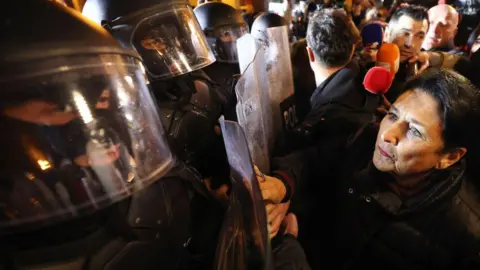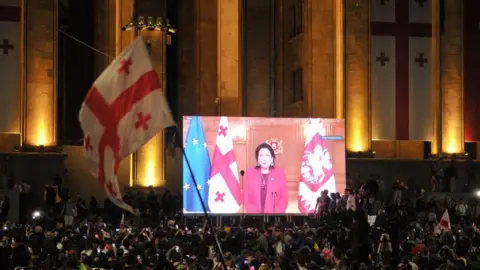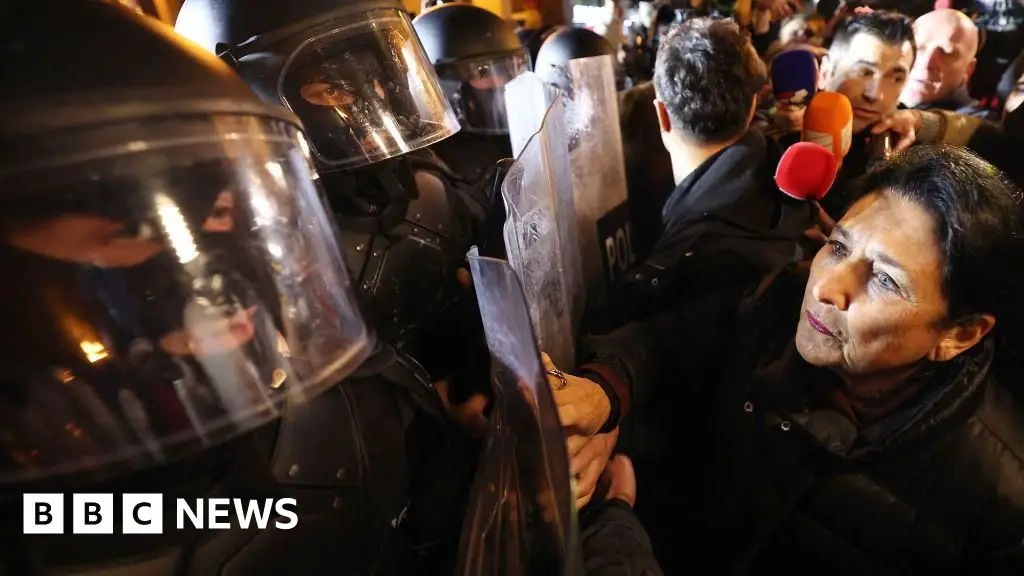 Getty Images
Getty ImagesSalome Zourabichvili’s family fled Georgia in 1921 after Soviet forces destroyed the country’s three-year experiment with independence from Russia.
A century later, Georgia’s pro-Western president refuses to resign, saying she is the last legitimate institution in her country.
Her six-year term as president ends on Sunday. According to a new system for selecting the head of state, she will be replaced on this day by former Manchester City footballer Mikheil Kavelashvili, who was chosen with the support of the ruling Georgian Dream party.
Zourabichvili, 72, has denounced his election as a farce in an electoral college in which he was the only candidate.
She was supported by Georgian Dream when she became president in 2018, but she has since condemned the controversial election victory in late October as a “Russian special operation” and supported nightly pro-EU protests outside parliament.
The government says if she refuses to leave office she is committing a crime.
If she is forced, she says, the ruling party’s takeover of the state will be complete and Georgia will have ceded its sovereignty to a party that accuses it of serving Moscow.
“A mythical place”
Salome Zourabichvili was born in France in 1952 into a prominent family of Georgian émigrés. Her grandfather, a minister in the government of briefly independent Georgia, fled to France in 1921.
Georgia, which was then under Soviet rule, played a big role in her childhood. It was a “mythical place that only existed in books,” she said in a 2004 interview.
Although she grew up in a culturally Georgian environment, spoke the language at home and attended Georgian Orthodox services, she integrated easily into French culture. She attended France’s elite schools, including Sciences Po, traditionally a haven for the country’s most senior civil servants.
She was notable for serving as a French diplomat for almost 30 years. But her true passion remained to free her parents’ mysterious country of origin from Russian influence and bring it closer to the West.
“She sees it as her life’s mission to bring Georgia to Europe. Everything else was always secondary to her,” said Alexandre Crevaux-Asatiani, a former adviser to Zourabichvili.
In 2003 she was appointed French ambassador to Georgia. A year later, she received Georgian citizenship and was appointed foreign minister under President Mikheil Saakashvili. After her release in 2005, she took on an increasingly important role in the politics of her adopted country and founded a new party.
Saakashvili’s rule ended in 2012 and Georgian Dream has been in power ever since. The party’s founder, billionaire Bidzina Ivanishvili, is widely viewed by Georgians as their country’s most powerful man. By a twist of fate, he is also French and took citizenship in 2010.
Zurabishvili, who was supported for the presidency by Ivanishvili’s party, was initially unpopular among the country’s pro-Western youth. A popular television show made fun of her halting Georgian, which she spoke with a strong French accent.
 Getty Images
Getty ImagesShe was considered a supporter of the ruling party and was unpopular with many young people. She blamed Georgia for the brief war with Russia in 2008, which allowed itself to be provoked.
But over the course of her term as president, Georgian Dream took an increasingly authoritarian and anti-Western turn, cracking down on civil society and NGOs. After the all-out invasion of Ukraine, it refused to join Western sanctions against Russia and described the West as a “global war party,” ridiculing its stated goal of joining the EU and NATO.
Zurabishvili openly opposed the government, believing that it had the support of the majority of Georgia’s population.
She promised to veto a “foreign influence” bill that mirrored Russian legislation passed under President Vladimir Putin, but the government passed it anyway, defying weeks of protests.
“Georgia has a choice between independence or slavery, Europe or Russia,” she said in April.
She has often addressed the protesters who demonstrated outside parliament every night for a month, portraying them as the nation’s conscience against a Russia-friendly government.
Last month she asked riot police accused by the opposition of brutally attacking protesters: “Do you serve Russia or Georgia?”
Many protesters who initially distrusted the president because she came to power with the support of Georgian Dream now respected her open defiance.
“Nobody expected her to be this good. It reflects our values,” said Irakli, a 34-year-old who demonstrates regularly. “It motivates us to fight.”
Before the disputed elections in October, the government tried to impeach her for meeting with EU leaders without government authorization. Ultimately the attempt failed, but it was a foreshadowing of the showdown to come.
Zurabishvili called the elections that brought the “Georgian Dream” back to power “completely fake.” She supported opposition parties’ calls for a repeat, drawing the ire of senior party leaders.
“Let’s see where she ends up.”
It now faces perhaps its biggest challenge yet as Georgian Dream prepares to install its successor, Mikheil Kavelashvili, as president.
But Zourabichvili has insisted she will not go, likely leading to a constitutional crisis. The Prime Minister of the Georgian Dream, Iraqi Kobakhidze, has threatened her with arrest.
“Let’s see where she ends up, behind bars or outside,” he told reporters this week.
The government will probably force them to leave one way or another, said Petre Tsiskarishvili of the opposition United National Movement.
Aware that he does not want to turn her into a political martyr and further raise her profile, he said he could avoid a high-profile arrest, adding that she might simply be barred from her official residence in the Orbeliani Palace would.
The doubts about her will remain. Some in the opposition accuse her of giving Georgian Dream’s authoritarian turn a pro-European face for far too long and refraining from criticizing Ivanishvili until a few months ago.
But in a country where pro-European forces are often splintered, Zurabishvili’s supporters say she is likely to emerge as the government’s main challenger once she is in office.
“Even if she is arrested, she will still be considered the legitimate president of Georgia. There is no doubt about that,” said Crevaux-Asatiani, the former presidential adviser.






